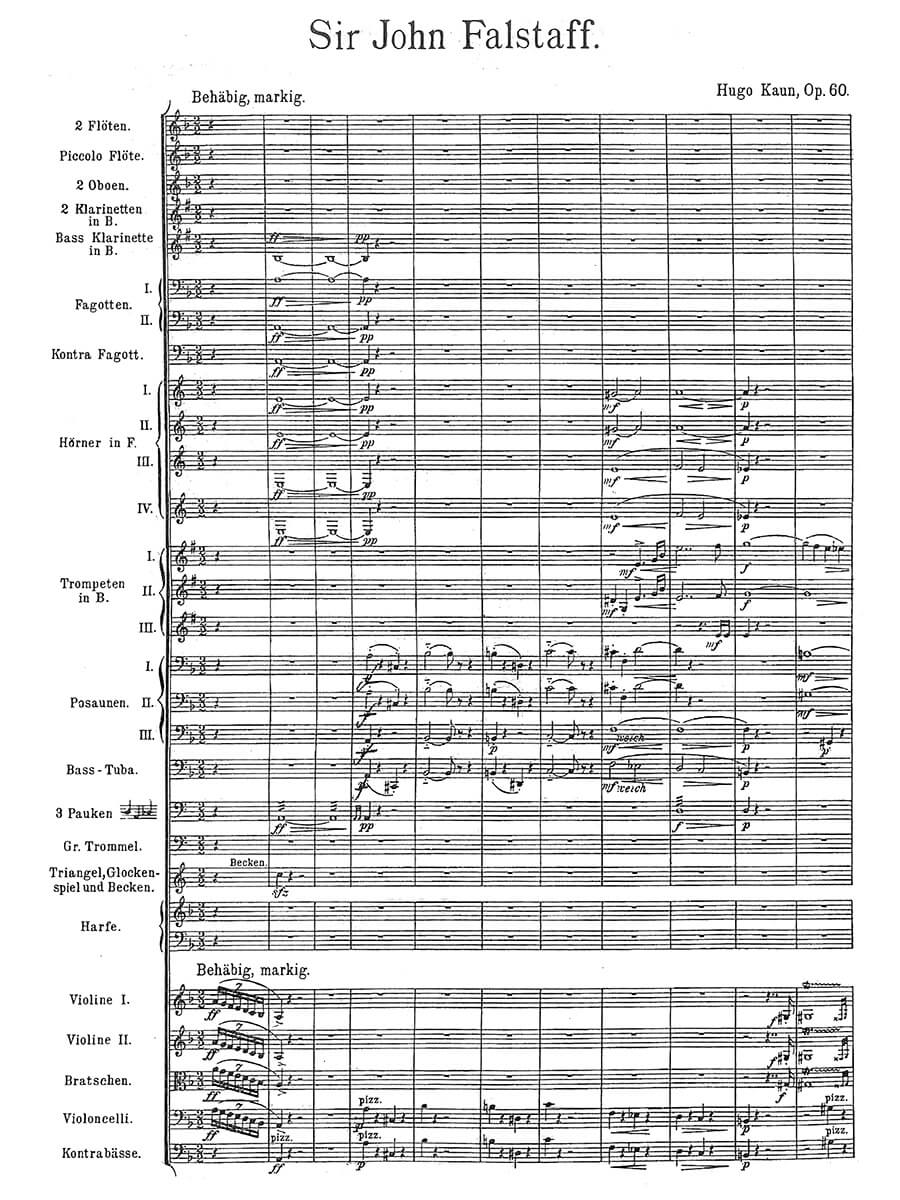Falstaff, a Humoresque for Orchestra, Op. 60
Kaun, Hugo
25,00 €
Preface
Hugo Kaun
(b. Berlin, 21. March 1863 – d. Berlin, 2. April 1932)
Sir John Falstaff
A Humoresque for Orchestra, Op. 60
“…Shakespeare’s greatest creation.”
(Orson Welles, in regard to his portrayal of Sir John Falstaff in “Chimes at Midnight,” his
1966 film adaptation of Shakespeare’s plays incorporating the portly knight.)
“On the fourth of January, I wrote the last note of this work, which was to have been a token of my veneration
and affection for Theodore Thomas. On the same day I received the news of his demise. So may it then remain
a monument to my true friendship for the founder of the Chicago Orchestra.”
(The preface notes appended to the score by Hugo Kaun, upon learning of the death
of his friend and champion Theodore Thomas.)
Falstaff. The name William Shakespeare bequeathed to one of his immortal characters, one based more on the legend, rather than the factual legacy, of Sir John Fastolf, and by playing up the legend created a man who, in spite of his knighthood, thumbs his nose at nearly everything that is considered the establishment of his day. He steals, he cheats, he revels in the spirits and, above all else, he naps! The noted English scholar and statesman Maurice Morgann (1725-1802) summed up Shakespeare’s conception in his 1777 treatise An Essay on the Dramatic Character of Sir John Falstaff: “He is a man at once young and old, enterprising and fat, a dupe and a wit, harmless and wicked, weak in principle and harmless by and resolute by constitution, cowardly in appearance and brave in reality, a knave without malice, a liar without deceit, and a knight, a gentleman and a soldier without either dignity, decency or honour.”
Falstaff’s antics and charm has inspired not only Giuseppe Verdi in his final opera of 1893, but other composers as well, from operas by Salieri (Falstaff, ossia Le Tre Burie, 1799), Nicolai (The Merry Wives of Windsor, 1849), Vaughan Williams (Sir John in Love, 1928) and Gordon Getty (Plump Jack, 1982-87), but also a major orchestral work from the pen of Sir Edward Elgar, whose 1913 symphonic poem Falstaff (subtitled “A Symphonic Study in C minor”), principally inspired by Morgann’s essay, has slowly found its way into the repertoire over the years, primarily through the championship of such notable conductors as Sir John Barbirolli and Bernard Herrmann. Even Sir William Walton, in his score for Sir Laurence Olivier’s 1944 cinematic adaptation of Henry V, pens a noble elegy for the knight, which was extracted from the score as part of a two-movement concert suite for string orchestra. …
Read full preface > HERE
Score Data
| Edition | Repertoire Explorer |
|---|---|
| Genre | Orchestra |
| Size | 225 x 320 mm |
| Printing | Reprint |
| Pages | 82 |
